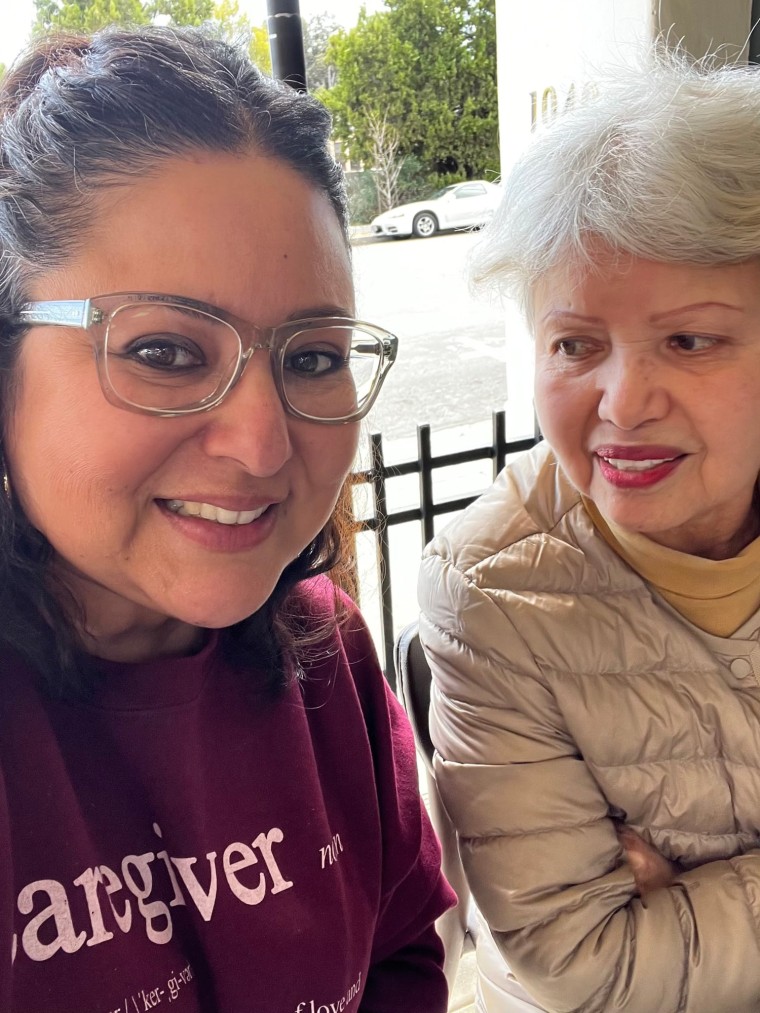For a decade, Alma Valencia has taken on the task of caring for her mother, Arminda, who suffers from dementia.
“I’ve had to take on that role of being a nurse — a person that does everything for my mom — dressing her, bathing her, feeding her. And it’s like having another child but that’s an adult, you know?” Valencia said. “It’s very, very tough, emotional, very, very draining.”
Valencia is one of the approximately 63 million people in the U.S. — about a quarter of the entire U.S. population over the age of 18 — who have taken on the role of caring for a loved one who needs additional attention due to issues such as aging, disabilities or illness, according to a new report from AARP and the National Alliance for Caregiving.
Most of them do it without getting paid, and 6 in 10 are employed apart from the caregiving work they do at home. “It’s an invisible workforce that strengthens our families and our communities,” the report notes. In the Hispanic community, over one-third of all caregivers and almost half of caregivers are also in households where they’re taking care of children under 18.
Now there are worries among caregivers like Valencia over how Trump’s “big, beautiful bill” that recently passed the Republican-led Congress will cut Medicaid funding and implement tougher Medicaid eligibility requirements. Some caregivers get financial help through programs funded by Medicaid, and some rely on Medicaid for their own medical care.
Among the programs at risk due to funding cuts to Medicaid is the Home and Community-Based Health Services (HCBS) program, which in some states offers a stipend to those who care for their loved ones at home to help cover things like medications or day care centers.

Valencia says this type of program is a much-needed relief, as she estimates her family already spends about $20,000 a year on out-of-pocket expenses for things like home improvements, such as installing ramps.
Half of caregivers have taken a financial hit, according to the report, and almost a quarter exhausted their short-term savings and are taking on debt, according to the report. Among Latinos like Valencia, almost a third (31%) reported being in debt and depleting their short-term savings. Latinos make up about 16% of caregivers in the U.S.
Now Valencia, who lives in California, worries the situation could become more severe. Even before any Medicaid cuts go into effect, Valencia said she’s seen changes in what’s accessible to her.
At the day care program where she takes her mom, “they were able to drop off Mom, pick her up. So they were able to support me with transportation. Now I’ve had to step in, and so that was removed. It’s little, little changes like that that I’m seeing,” she said.
Approximately 8 million family caregivers rely on Medicaid for their own medical care, and 11 million receive HCBS-like stipends through the program, according to Jason Resendez, president and CEO of the National Alliance for Caregiving.
“It is very likely that those pathways will start to diminish because of tough choices that states will have to make in terms of what to fund with less federal Medicaid dollars,” Resendez said at an event presenting the AARP report. “Historically research has shown that when states have less money and are forced to make decisions Home and Community Benefits are the first optional benefits to get cut.”
The planned Medicaid cuts and changes include an increase in the number of minimum hours needed to work in order to receive benefits.
Resendez said this will affect caregivers, who often can only work part-time jobs so they can care for their loved ones and won’t be able to work additional hours as may be required under new Medicaid rules.
The increase in family members acting as unskilled caregivers could become more pronounced in the coming years not only because of budget cuts, but also due to the Trump administration’s immigration actions, according to experts. This is because many immigrants work as nurses for the elderly or the disabled.
Many immigrants from countries like Venezuela and Haiti who had work permits for jobs, including nursing, have now had their temporary legal status revoked by the Trump administration, who ended programs like TPS and humanitarian parole.
If more families lose that formal support, they may have to take on the role of caregivers directly.
Valencia lives near the San Diego area, where Republican Rep. Darrell Issa, who voted for the bill, defended the proposed changes to Medicaid spending and eligibility.
“Republicans in Congress are saving Medicaid by ending waste, eliminating fraud, and ensuring it will be there for the American people who need it,” Jonathan Wilcox, deputy chief of staff and communications director for Issa, said via email to Noticias Telemundo.
Ahead of the planned Medicaid and budget cuts, Resendez said public policies must not lose sight of the caregiving population, whether through potential financial assistance, such as tax credits, and more programs that provide medical training and payment to caregivers.
Meanwhile, social media has enabled caregivers to share their experiences and knowledge.
“This way, we can see how each other is doing and share resources and valuable information,” said Valencia, who posts her experiences as a caregiver on Instagram under the Caregiver Comadre account.
“I really wish in the Latino community that we shared more of what we’re experiencing,” she said, noting many people tend to be very private. “The more that we share, the more we normalize the experience, and we open up the opportunity of helping each other out.”
An earlier version of this story was first published in Noticias Telemundo.


